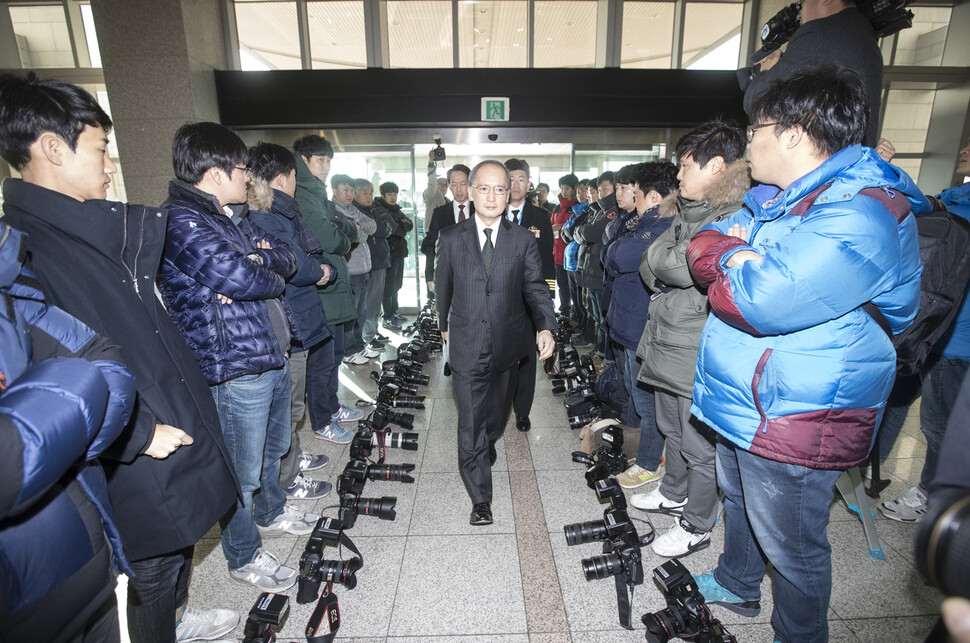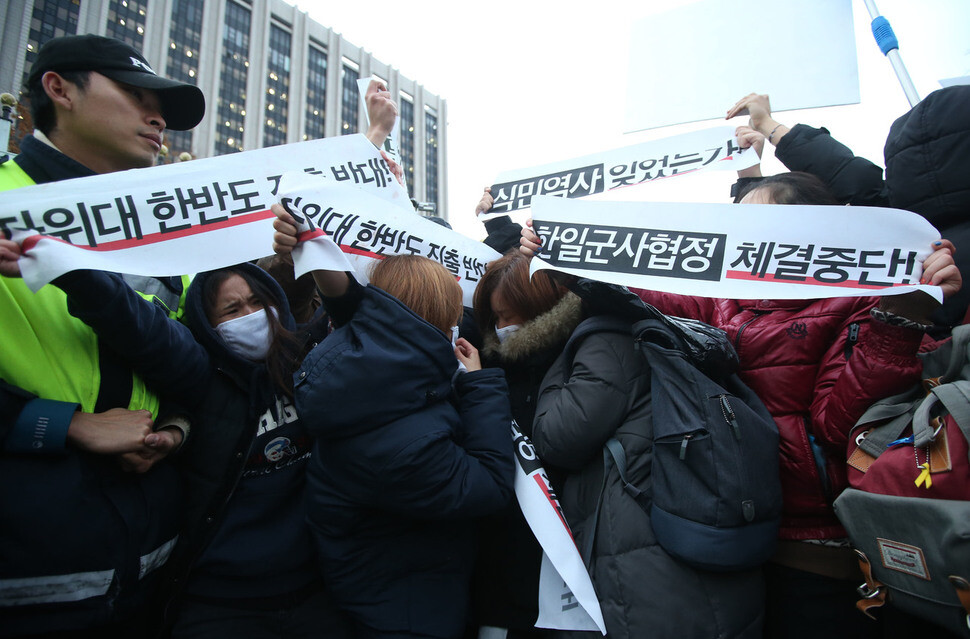hankyoreh
Links to other country sites 다른 나라 사이트 링크
Despite criticism, South Korea signs GSOMIA with Japan

Despite criticism from all sides, the South Korean cabinet voted in favor of the bilateral General Security of Military Information Agreement (GSOMIA) with Japan, and President Park Geun-hye immediately gave her approval. This is sure to provoke a fierce backlash from opposition parties and civil society.
At 8 am on Nov. 22, a cabinet meeting presided over by Deputy Prime Minister Yoo Il-ho reviewed the information-sharing agreement (submitted as Bill No. 1712) and voted in favor of it. On the afternoon of the same day, the Blue House announced that Park had approved the agreement.
“Given the specific and serious threat that is posed by North Korea’s nuclear weapons and missiles, we need to work with Japan, which has excellent intelligence assets. The Defense Ministry and other government agencies will continue their efforts to secure the consent and the support of the public,” the government said in a document that it gave reporters detailing the outcome of the cabinet meeting.

As a consequence, GSOMIA took effect as soon as South Korean Defense Minister Han Min-koo and Japanese Ambassador to South Korea Yasumasa Nagamine held the signing ceremony at South Korea’s Defense Ministry in Seoul on Nov. 23. The Defense Ministry has pushed through the agreement with military precision, completing all the steps - including the working-level negotiations, the initialing, the cabinet vote, the signing and putting the agreement into force - in just 27 days after announcing its plans to reopen negotiations about the agreement on Oct. 27.
Opposition parties have strongly attacked the agreement, describing the negotiations as “rushed and unpatriotic, carried out by a president who is not even qualified to run the country.”
“GSOMIA is the product of disgraceful and unpatriotic negotiations that the public does not accept. We will hold all parties who led or consented to this agreement strictly responsible for their actions,” said Gi Dong-min, floor spokesperson for the Minjoo Party, in a briefing on Nov. 22.
“The three opposition parties hold that we cannot help the government of [Japanese Prime Minister] Shinzo Abe arm its self-defense forces without some kind of historical reckoning in our relations with Japan. It‘s particularly wrong of the government to unilaterally push through this agreement before the president’s impeachment or resignation, without any consent from the public, and indeed in the face of their opposition,” said Park Jie-won, chair of the emergency committee for the People’s Party and the party’s floor leader, during a meeting of the floor action committee on Nov. 22.
“There are numerous signs that the government’s desperate attempt to reach this agreement is connected in some way with the decision to deploy THAAD in July. The only fate of an agreement pushed through by someone who is not fit for office is to be rescinded,” said Kim Jong-dae, floor spokesperson for the Justice Party, in a statement.
The three opposition parties agreed to submit a motion on Nov. 30 for the dismissal of the Minister of Defense, who is the minister responsible for ramming through GSOMIA. While the People’s Party and the Justice Party indicated that they still support submitting such a bill as planned, the Minjoo Party adopted a more cautious stance, expressing concern that attempting to dismiss the defense minister while also trying to impeach the president could provoke insecurity among the public.
At the same time, Gi Dong-min left open the possibility of joint action by the three opposition parties: “The Minjoo Party’s position is that we need to hear more opinions from party members about whether submitting a bill of dismissal is a viable option. But since this is an agreement between the three opposition parties, it’s not something that the Minjoo Party can decide on its own.”
By Jung In-hwan, Lee Jung-ae and Choi Hye-jung, staff reporters
Please direct questions or comments to [english@hani.co.kr]

Editorial・opinion
![[Guest essay] Preventing Korean Peninsula from becoming front line of new cold war [Guest essay] Preventing Korean Peninsula from becoming front line of new cold war](https://flexible.img.hani.co.kr/flexible/normal/500/300/imgdb/original/2024/0507/7217150679227807.jpg) [Guest essay] Preventing Korean Peninsula from becoming front line of new cold war
[Guest essay] Preventing Korean Peninsula from becoming front line of new cold war![[Column] The state is back — but is it in business? [Column] The state is back — but is it in business?](https://flexible.img.hani.co.kr/flexible/normal/500/300/imgdb/original/2024/0506/8217149564092725.jpg) [Column] The state is back — but is it in business?
[Column] The state is back — but is it in business?- [Column] Life on our Trisolaris
- [Editorial] Penalties for airing allegations against Korea’s first lady endanger free press
- [Editorial] Yoon must halt procurement of SM-3 interceptor missiles
- [Guest essay] Maybe Korea’s rapid population decline is an opportunity, not a crisis
- [Column] Can Yoon steer diplomacy with Russia, China back on track?
- [Column] Season 2 of special prosecutor probe may be coming to Korea soon
- [Column] Park Geun-hye déjà vu in Yoon Suk-yeol
- [Editorial] New weight of N. Korea’s nuclear threats makes dialogue all the more urgent
Most viewed articles
- 1Behind-the-times gender change regulations leave trans Koreans in the lurch
- 2Family that exposed military cover-up of loved one’s death reflect on Marine’s death
- 3Yoon’s revival of civil affairs senior secretary criticized as shield against judicial scrutiny
- 4South Korean ambassador attends Putin’s inauguration as US and others boycott
- 5Marines who survived flood that killed colleague urge president to OK special counsel probe
- 6‘Weddingflation’ breaks the bank for Korean couples-to-be
- 7Yoon’s broken-compass diplomacy is steering Korea into serving US, Japanese interests
- 8Hybe-Ador dispute shines light on pervasive issues behind K-pop’s tidy facade
- 9Lee Jung-jae of “Squid Game” named on A100 list of most influential Asian Pacific leaders
- 10[Guest essay] Preventing Korean Peninsula from becoming front line of new cold war